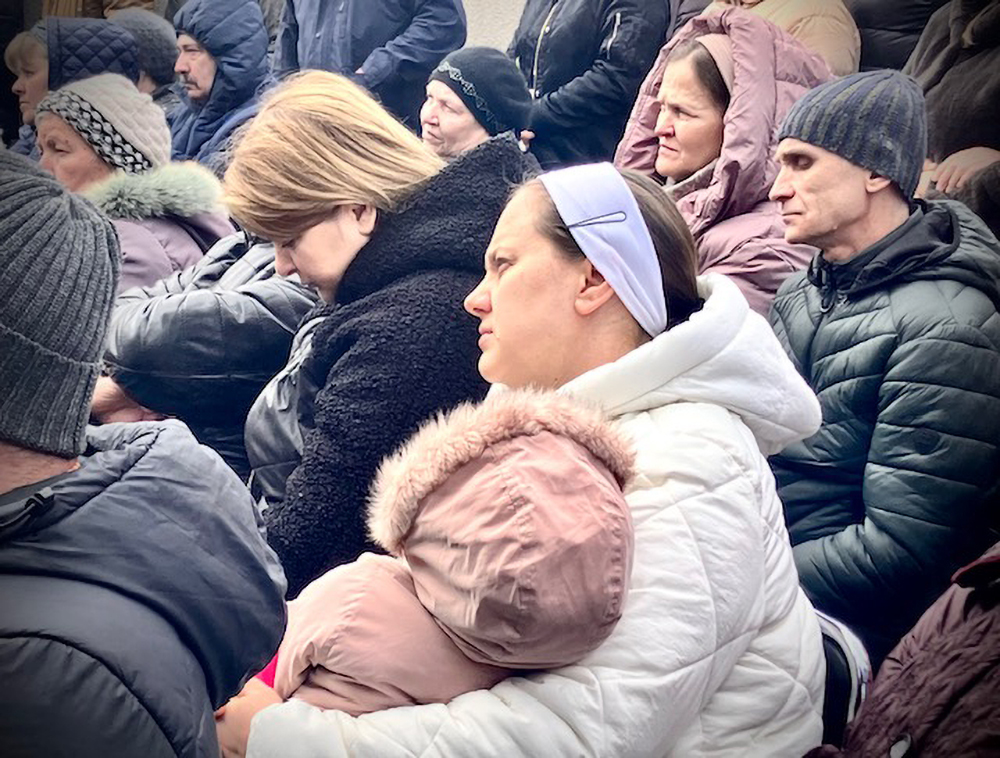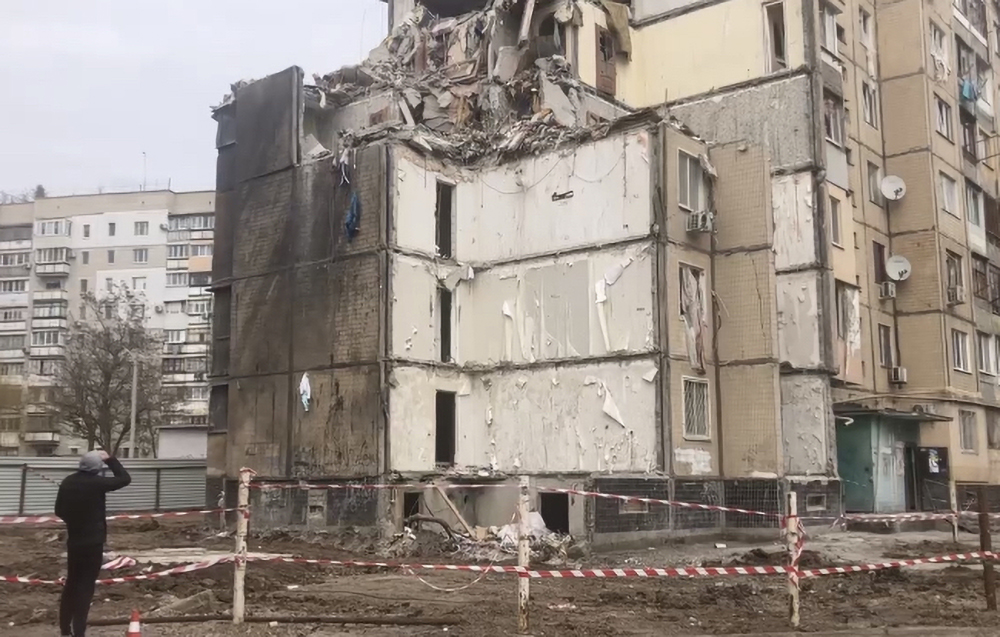
Odesa, a major Black Sea port located in the south of Ukraine, was targeted by incessant drone and ballistic missile attacks in March 2024. After Russian President Vladimir Putin again announced Odesa “a Russian city” to the outrage of Odesites, the UNESCO-protected “pearl by the sea” became a target for everyday assaults.
Notably, multiple drone attacks followed the distribution of videos from the Shahed-131/136 production plant in Russia, potentially serving as a psychological intimidation operation to undermine Ukrainian morale.
On March 2, a Russian drone struck a nine-story building in Odesa after 1 a.m. A part of the building collapsed and 18 apartments were destroyed, resulting in the death of 12 civilians, including five children.

The youngest, Timofei, only four months old, died in his mother’s arms. So did seven-month-old Lisa, whose siblings, eight-year-old Zlata and 10-year-old Serhii, and the father were also killed in their sleep. The only survivor in this family was a 16-year-old brother who was visiting his grandparents that night. Mark, almost three, also died next to his mother.
Oleksii, a first responder, who discovered the dead children, did not want to comment. He said that rescuers do not have much to say: He just stood by the newly formed cliff of the building, looking at the spot where Serhii was found, curled in a ball.
Svitlana Karnitsova, a 26-year-old math teacher, survived the explosion “by miracle”: She forgot to close her window in her bedroom, and the shock wave did not break the glass over her bed. Waking up in dense dust, with fire just breaking out, she rushed out to the hallway where she met her mother and handicapped father. She had only a minute to grab her “anxiety backpack”— documents, a power bank—and rush her parents out.
Their five-room apartment on the first floor was destroyed by the collapsing building. The neighbors’ books—Harry Potter, Russian iconic poet Alexander Pushkin’s verses and Ukrainian folklore—landed next to Svitlana’s home slippers and herbs her mother was drying on the windowsill.
“This is—was—our living room,” said Svitlana, pointing at the mound of gray rubble in a pit. “I have lived here all my life; I was born here. My parents moved here way before that. This was my whole life. Please, help us to stop this. Help us to save lives.”
Her father sat in the yard by the small stash of things the family managed to get out of the ruins. Behind him, local residents continued to bring flowers and stuffed toys in a makeshift memorial to those killed on March 2. March 5 was announced as a day of mourning for Odesa.
The following two weeks brought little sleep and much anxiety. With daily funeral ceremonies, the city mourned the killed.
On the night of March 6, the Russians launched another swarm of Shahed-131/136 kamikaze drones at Odesa and the surrounding region. The drones, organized in 10 groups, were intercepted by the air defense system. Thirty-eight of the 42 drones were successfully shot down by the Ukrainian air defense. Some drones were destroyed over the sea before they could reach Odesa.
Detection and interception are challenging due to the low altitude maintained over the sea, but the drones become more vulnerable as they approach the coast. The maneuvers of the drones in residential areas complicate the air defense operations, the head of the Odesa Regional Administration explained.

The debris caused damage to a gas pipeline, a recreational facility and residential buildings in the private sector in the Odesa region, but no casualties were reported.
The following morning, at 10:45 a.m., the Russian military attacked Odesa with a ballistic missile, resulting in casualties and injuries. Ukrainian President Volodymyr Zelenskyy was visiting Odesa with the prime minister of Greece, Kyriakos Mitsotakis.
An air raid alarm was declared at 10:41 a.m., followed by a powerful explosion at 10:45 a.m., with the Air Force reporting the threat of ballistic weapons in the alerted areas. Explosions happened reportedly 100–500 meters from the officials, and they could not reach a shelter in time.
At a Baptist church, the shock wave went through the crowd of mourners gathered for the funeral of baby Timofei and his mother.
On March 11, Odesa residents were kept awake between 3 a.m. and 4 a.m. by another Shaheed drone attack. The assault coincided with the Oscars ceremony in Los Angeles, where the Ukrainian documentary 20 Days in Mariupol won the country’s first Oscar award. Attacks also happened in Kharkiv, Kherson and other regions at the same time. In Odesa, an infrastructure object was hit and an administrative building was damaged.
On the next night, March 12, another overnight drone attack was followed by an X-59 missile strike. The Ukrainian air defense shot down all the drones and missiles.
On March 13, Russia attempted to attack Odesa with two ballistic missiles. Both broke by the shore and fell, without causing damage.
On March 14, a Shaheed drone attack drove many people into shelters around dinner time, between 7 p.m. and 8 p.m.
On March 15, at 11 a.m.–11.45 am, the Russian Federation attacked Odesa with two 9M723 Iskander OTRK missiles from occupied Crimea, according to Ukraine’s Defense Forces of the South. The missiles targeted the resort area.
After the first attack, a fire started and the air filled with the smell of gas and smoke. A huge explosion crater filled with water after firefighters extinguished the fire. Nearby trees were uprooted and burned down.
Ambulances and fire-rescue vehicles, along with private cars, were destroyed by shrapnel and debris. The blast waves caused building damage, with walls and ceilings collapsing and glass shattering.
As the residents ran out to the streets after the blast and the first responders arrived at the scene, a second explosion followed, resulting in more casualties, including rescuers and ambulance workers.
This tactic is called a “double-tap” and is used by the Russian military consistently, specifically in the south of Ukraine, according to Natalia Humeniuk, the head of the Joint Coordination Press Center of the Southern Ukraine Defense Forces.
The attack led to the destruction of a three-story recreation center, private houses, a service station and a low-pressure gas pipeline. Twenty-one residents were killed, including first responders and the police; 73 others were injured, including State Emergency Service employees.
Many city officials were killed, including former deputy city mayor Serhii Tetyukhin, who took an active part in the efforts to inscribe the historical center of Odesa on the UNESCO List of World Heritage in Danger. Having quit his position and joined the army to defend his country, he was killed by the very barbaric attacks he was trying to prevent from destroying his city.
March 16 was declared yet another mourning day in Odesa and the region.
Odesa and its port infrastructure continue to face ongoing missile and drone attacks from the Russian military. There is a pressing need for air defense to intercept ballistic and hypersonic missiles.

